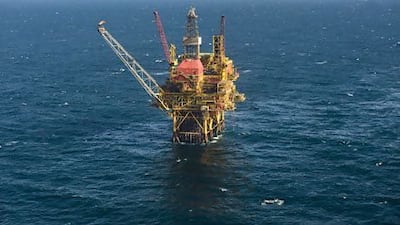Abu Dhabi National Energy Company, or Taqa as it is known, is retaining the vast majority of its oil and natural gas assets following an almost year-long strategic review.
The strong contribution of the oil and gas business to Taqa's earnings amid a surge in global hydrocarbon prices is among the reasons it has decided to keep the assets, Taqa said in a statement on Tuesday.
The decision takes into account "macroeconomic changes" during the past 12 months, which are expected to continue for some time, as well as “other asset-specific drivers”, the company said.
From its oil and gas portfolio, the company only plans to divest its upstream assets in the Netherlands, where it is already in discussions for the sale. The decision is based on “the nature of the assets and the relatively small contribution the assets make to Taqa's group earnings”, the company said.
“We have conducted an extensive review of our oil and gas portfolio, including reaching out to the market to explore the potential for disposal,” Jasim Thabet, group chief executive and managing director of Taqa, said.
“Retaining the vast majority of the portfolio will deliver the best value for the company and its stakeholders. This is in part evidenced by the strong contribution — over 15 per cent — that the oil and gas business contributed to our revenue and earnings in 2021. That trend has continued into this year.”
In September, Taqa announced the strategic review to assess all options for its oil and gas division and “the optimal course for its future development while taking into consideration the evolution of the global energy industry as it transitions towards a cleaner and more sustainable future".
Oil prices gained 67 per cent last year as the global economy bounced back from the Covid-19 pandemic-driven slowdown. They have remained volatile this year as Russia’s military assault on Ukraine continues.
Brent, the global benchmark for two-thirds of the world’s oil, rose to a notch under $140 per barrel in March. It has since given up some gains but is still 45 per cent higher since the beginning of this year.
Brent was trading 1.29 per cent lower at $112.04 per barrel at 4.17pm UAE time. West Texas Intermediate, the gauge that tracks US crude, was up 0.30 per cent at $108.76 a barrel.

Last month, Suhail Al Mazrouei, Minister of Energy and Infrastructure, said oil prices could go higher as Chinese demand is set to recover significantly, while efforts by Opec+ group of producers to raise production were not yielding results fast enough.
In June, Opec maintained its forecast that world oil demand would exceed pre-pandemic levels in 2022, but said Russia’s military offensive in Ukraine, developments related to the pandemic and inflationary pressures posed a “considerable risk”.
The group maintained oil demand forecast for this year at 3.36 million bpd, unchanged from the previous month's forecast. Global oil consumption in 2022 is projected to average 100.29 million bpd, with demand exceeding 2019 levels by 0.09 million bpd, according to its estimates.
Taqa, which has upstream and midstream assets in the UK North Sea, the Netherlands, Canada and the Kurdish region of Iraq, is pivoting to become a clean energy champion.
In April, Taqa announced its 2030 strategy that involves investing $10.9 billion in infrastructure development as it seeks to add about 27 gigawatts of power capacity and expand its renewables portfolio.
The company plans to expand its power-generation capacity in the UAE from 18 gigawatts to 30 gigawatts and boost its global generating capacity by 15 gigawatts.
It currently has the Al Dhafra Solar PV Plant under construction, which will overtake Noor Abu Dhabi — also run by Taqa — to become the world’s largest single site solar PV plant, once completed.
“Our strategy remains to be a champion for low carbon power and water for Abu Dhabi and beyond and to continue to improve and expand our utility businesses, with a clear focus on renewables,” Mr Thabet said.
“As such, we remain committed to becoming a net zero company by 2050.”
The UAE, Opec's third-largest oil producer, plans to invest Dh600bn ($163bn) by 2050 in renewable and clean energy capacity and achieve net-zero emissions in the next three decades. The UAE will also host the 28th UN global climate talks next year.
Taqa, Abu Dhabi National Oil Company and Mubadala Investment Company last month entered into binding agreements that will see Taqa and Adnoc acquire stakes in green energy company Masdar from Mubadala.
The partnership, announced last year by President Sheikh Mohamed, aims to create one of the largest renewable energy companies in the world and a pioneer in green hydrogen under the Masdar brand.


